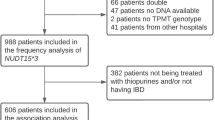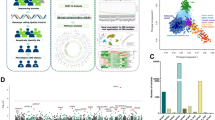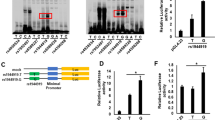Abstract
Pancreatitis occurs in approximately 4% of patients treated with the thiopurines azathioprine or mercaptopurine. Its development is unpredictable and almost always leads to drug withdrawal. We identified patients with inflammatory bowel disease (IBD) who had developed pancreatitis within 3 months of starting these drugs from 168 sites around the world. After detailed case adjudication, we performed a genome-wide association study on 172 cases and 2,035 controls with IBD. We identified strong evidence of association within the class II HLA region, with the most significant association identified at rs2647087 (odds ratio 2.59, 95% confidence interval 2.07–3.26, P = 2 × 10−16). We replicated these findings in an independent set of 78 cases and 472 controls with IBD matched for drug exposure. Fine mapping of the HLA region identified association with the HLA-DQA1*02:01–HLA-DRB1*07:01 haplotype. Patients heterozygous at rs2647087 have a 9% risk of developing pancreatitis after administration of a thiopurine, whereas homozygotes have a 17% risk.
This is a preview of subscription content, access via your institution
Access options
Subscribe to this journal
Receive 12 print issues and online access
$209.00 per year
only $17.42 per issue
Buy this article
- Purchase on SpringerLink
- Instant access to full article PDF
Prices may be subject to local taxes which are calculated during checkout

Similar content being viewed by others
References
Health and Social Care Information Centre. Quarterly Prescription Cost Analysis, England (UK Government Statistical Service, London, 2013).
Prefontaine, E., Sutherland, L.R., Macdonald, J.K. & Cepoiu, M. Azathioprine or 6-mercaptopurine for maintenance of remission in Crohn's disease. Cochrane Database Syst. Rev. 1, CD000067 (2009).
Timmer, A., MacDonald, J.W., Tsoulis, D.J. & Macdonald, J.K. Azathioprine and 6-mercaptopurine for maintenance of remission in ulcerative colitis. Cochrane Database Syst. Rev. 9, CD000478 (2012).
Cosnes, J. et al. Early administration of azathioprine vs conventional management of Crohn's disease: a randomized controlled trial. Gastroenterology 145, 758–765 (2013).
Chaparro, M. et al. Safety of thiopurine therapy in inflammatory bowel disease: long-term follow-up study of 3931 patients. Inflamm. Bowel Dis. 19, 1404–1410 (2013).
Gearry, R.B., Barclay, M.L., Burt, M.J., Collett, J.A. & Chapman, B.A. Thiopurine drug adverse effects in a population of New Zealand patients with inflammatory bowel disease. Pharmacoepidemiol. Drug Saf. 13, 563–567 (2004).
Daly, A.K. et al. HLA-B*5701 genotype is a major determinant of drug-induced liver injury due to flucloxacillin. Nat. Genet. 41, 816–819 (2009).
Mallal, S. et al. HLA-B*5701 screening for hypersensitivity to abacavir. N. Engl. J. Med. 358, 568–579 (2008).
Gallagher, R.M. et al. Development and inter-rater reliability of the Liverpool adverse drug reaction causality assessment tool. PLoS ONE 6, e28096 (2011).
Wellcome Trust Case Control Consortium. Genome-wide association study of 14,000 cases of seven common diseases and 3,000 shared controls. Nature 447, 661–678 (2007).
Barrett, J.C. et al. Genome-wide association study of ulcerative colitis identifies three new susceptibility loci, including the HNF4A region. Nat. Genet. 41, 1330–1334 (2009).
1000 Genomes Project Consortium. A map of human genome variation from population-scale sequencing. Nature 467, 1061–1073 (2010).
Howie, B., Fuchsberger, C., Stephens, M., Marchini, J. & Abecasis, G.R. Fast and accurate genotype imputation in genome-wide association studies through pre-phasing. Nat. Genet. 44, 955–959 (2012).
Jia, X. et al. Imputing amino acid polymorphisms in human leukocyte antigens. PLoS ONE 8, e64683 (2013).
Ahmad, T. et al. The molecular classification of the clinical manifestations of Crohn's disease. Gastroenterology 122, 854–866 (2002).
Tilney, N.L., Collins, J.J. & Wilson, R.E. Hemorrhagic pancreatitis. A fatal complication of renal transplantation. N. Engl. J. Med. 274, 1051–1057 (1966).
Nogueira, J.R. & Freedman, M.A. Acute pancreatitis as a complication of Imuran therapy in regional enteritis. Gastroenterology 62, 1040–1041 (1972).
Marinaki, A.M. et al. Adverse drug reactions to azathioprine therapy are associated with polymorphism in the gene encoding inosine triphosphate pyrophosphatase (ITPase). Pharmacogenetics 14, 181–187 (2004).
Illing, P.T., Vivian, J.P., Purcell, A.W., Rossjohn, J. & McCluskey, J. Human leukocyte antigen–associated drug hypersensitivity. Curr. Opin. Immunol. 25, 81–89 (2013).
Kindmark, A. et al. Genome-wide pharmacogenetic investigation of a hepatic adverse event without clinical signs of immunopathology suggests an underlying immune pathogenesis. Pharmacogenomics J. 8, 186–195 (2008).
Spraggs, C.F. et al. HLA-DQA1*02:01 is a major risk factor for lapatinib-induced hepatotoxicity in women with advanced breast cancer. J. Clin. Oncol. 29, 667–673 (2011).
Illing, P.T. et al. Immune self-reactivity triggered by drug-modified HLA-peptide repertoire. Nature 486, 554–558 (2012).
Badalov, N. et al. Drug-induced acute pancreatitis: an evidence-based review. Clin. Gastroenterol. Hepatol. 5, 648–661 (2007).
Grant, R.L. Converting an odds ratio to a range of plausible relative risks for better communication of research findings. Br. Med. J. 348, f7450 (2014).
Oliphant, A., Barker, D.L., Stuelpnagel, J.R. & Chee, M.S. BeadArray technology: enabling an accurate, cost-effective approach to high-throughput genotyping. Biotechniques (suppl.), 56–58 (2002).
Goldstein, J.I. et al. zCall: a rare variant caller for array-based genotyping: genetics and population analysis. Bioinformatics 28, 2543–2545 (2012).
Barrett, J.C. et al. Genome-wide association defines more than 30 distinct susceptibility loci for Crohn's disease. Nat. Genet. 40, 955–962 (2008).
Anderson, C.A. et al. Meta-analysis identifies 29 additional ulcerative colitis risk loci, increasing the number of confirmed associations to 47. Nat. Genet. 43, 246–252 (2011).
Yang, J., Lee, S.H., Goddard, M.E. & Visscher, P.M. GCTA: a tool for genome-wide complex trait analysis. Am. J. Hum. Genet. 88, 76–82 (2011).
Manichaikul, A. et al. Robust relationship inference in genome-wide association studies. Bioinformatics 26, 2867–2873 (2010).
Sebastiani, P. et al. Retraction. Science 333, 404 (2011).
Li, Y., Willer, C.J., Ding, J., Scheet, P. & Abecasis, G.R. MaCH: using sequence and genotype data to estimate haplotypes and unobserved genotypes. Genet. Epidemiol. 34, 816–834 (2010).
Purcell, S. et al. PLINK: a tool set for whole-genome association and population-based linkage analyses. Am. J. Hum. Genet. 81, 559–575 (2007).
Scally, S.W. et al. A molecular basis for the association of the HLA-DRB1 locus, citrullination, and rheumatoid arthritis. J. Exp. Med. 210, 2569–2582 (2013).
Morris, G.M. et al. AutoDock4 and AutoDockTools4: automated docking with selective receptor flexibility. J. Comput. Chem. 30, 2785–2791 (2009).
Trott, O. & Olson, A.J. AutoDock Vina: improving the speed and accuracy of docking with a new scoring function, efficient optimization, and multithreading. J. Comput. Chem. 31, 455–461 (2010).
Acknowledgements
The International Serious Adverse Events Consortium (iSAEC) funded the sample collection and genotyping. The UK National Institute for Health Research (NIHR) provided research nurse support to facilitate recruitment at all UK research sites. We thank Crohn's and Colitis UK for funding support and publicizing this study to its members. A Wellcome Trust Institutional Strategic Support Award (WT097835MF) generously supported the work in this study. Genotyping was undertaken at the Broad Institute, Cambridge, Massachusetts, USA. We thank all the clinicians who assisted with sample collection as part of the IBD Pharmacogenetics Study Group (listed in the Supplementary Note) and the International IBD Genetics Consortium, as well as S. Marriott for her assistance during the trial initiation. We acknowledge The International Serious Adverse Events Scientific Management Committee members (listed in the Supplementary Note), T. Frayling, S. Lin and K. Hunt for kindly providing comments on the draft manuscript, as well as C. Heard and M. Parkinson for their ongoing administrative support to the study. We also thank all the patients for their time and participation.
Author information
Authors and Affiliations
Consortia
Contributions
G.A.H., K.S., T.K.D., D.A.v.H., P.C.D., A.L.H. and T.A. participated in the conception, design and coordination of the study. C.M.B. was the project manager and coordinated recruitment. G.A.H., M.N.W. and T.A. analyzed the data and participated in writing the paper. K.P. performed DNA preparation. The International Serious Adverse Events Consortium advised on the GWAS, performed genotyping and participated in writing the paper. A.C., T.C., P.C.D., E.G., P.M.I., J.O.L., J. Mawdsley, Z.M., T.R.O., D.R., G.A.H., A.S. and T.A. performed adjudication of the cases. M.C., J.B.S. and M.B. performed the SSP-based HLA genotyping. J.R. and J.P.V. performed the in silico structural analysis. K.S., J.M.A., V.A., P.B., S.B., A.C., S.J.C., T.C., F.R.C., M.D., T.K.D., R.N.F., T.H.F., D.R.G., E.G., J.H., A.H., P.M.I., G.J., A.K., I.C.L., J.C.L., C.L., R.L.-T., J.O.L., J. Mansfield, J. Mawdsley, Z.M., M.P., T.R.O., G.R.-S., R.K.R., D.R., J.S., M.S.S., G.C.S., M.T., E.V.T., A.W., G.W., R.K.W. and S.Z. contributed a substantial number of samples in line with International Committee of Medical Journal Editors criteria. All authors assisted in the writing, reviewing and approval of the manuscript.
Corresponding authors
Ethics declarations
Competing interests
The authors declare no competing financial interests.
Additional information
A complete list of all consortia members is provided in the Supplementary Note.
A complete list of all consortia members is provided in the Supplementary Note.
Integrated supplementary information
Supplementary Figure 2 The docking of mercaptopurine (ball-and-stick) to the P1-pocket HLA-DR7 (shown in surface representation)
The in silico docking runs resulted in the placement of mercaptopurine predominantly within the P1 pocket of HLA-DRB1*07:01 with docking scores (ΔG) of -4.6 kcal/mol. Interestingly, mercaptopurine could be docked into the P1 pockets of HLA-DP2 and HLA-DQ8 albeit with considerably different docking angles due to differences in the architectures of the P1 pockets. However, in the cases of both HLA-DRB1*01:01 and HLA-DRB1*04:01, in which the P1 pockets are conserved with that of HLA-DRB1*0701, there resulted identical docking modes and docking scores (ΔG) of -4.6 kcal/mol. The docking of mercaptopurine to the P1 pocket of HLA-DRB1*07:01 would likely affect the residue selection at this primary anchor point for the peptide and is consistent with the mechanism of drug-modified peptide repertoire as detailed previously for the drug abacavir (Illing, P. T. et al. Immune self-reactivity triggered by drug-modified HLA-peptide repertoire. Nature 486, 554–8 (2012)). However, the lack of binding specificity observed across the HLA-DRB1 alleles suggests that there are other factors in the peptide-binding cleft of HLA-DRB1*07:01, beyond the architecture of the P1 pocket alone, that contribute to the hypersensitivity reaction to mercaptopurine.
Supplementary Figure 3 Causality assessment tool
Adapted version of the Liverpool Adverse Drug Reaction Causality Assessment Tool used in the adjudication process. Adapted from Gallagher et al. (Gallagher, R.M. et al. Development and inter-rater reliability of the Liverpool adverse drug reaction causality assessment tool. PLoS One 6, e28096, 2011).
Supplementary information
Supplementary Text and Figures
Supplementary Figures 1–4, Supplementary Note and Supplementary Tables 1–7 (PDF 2711 kb)
Rights and permissions
About this article
Cite this article
Heap, G., Weedon, M., Bewshea, C. et al. HLA-DQA1–HLA-DRB1 variants confer susceptibility to pancreatitis induced by thiopurine immunosuppressants. Nat Genet 46, 1131–1134 (2014). https://doi.org/10.1038/ng.3093
Received:
Accepted:
Published:
Issue Date:
DOI: https://doi.org/10.1038/ng.3093
This article is cited by
-
Real-world NUDT15 genotyping and thiopurine treatment optimization in inflammatory bowel disease: a multicenter study
Journal of Gastroenterology (2024)
-
Thiopurines impair the apical plasma membrane expression of CFTR in pancreatic ductal cells via RAC1 inhibition
Cellular and Molecular Life Sciences (2023)
-
Pancreatic Disorders in Patients with Inflammatory Bowel Disease
Digestive Diseases and Sciences (2022)
-
Pancreas and Adverse Drug Reactions: A Literature Review
Drug Safety (2022)
-
Acute Pancreatitis: Diagnosis and Treatment
Drugs (2022)



